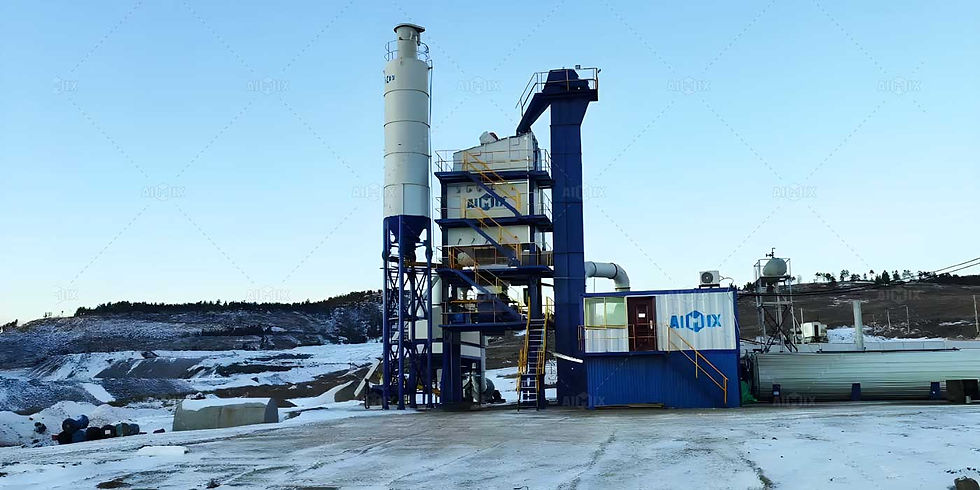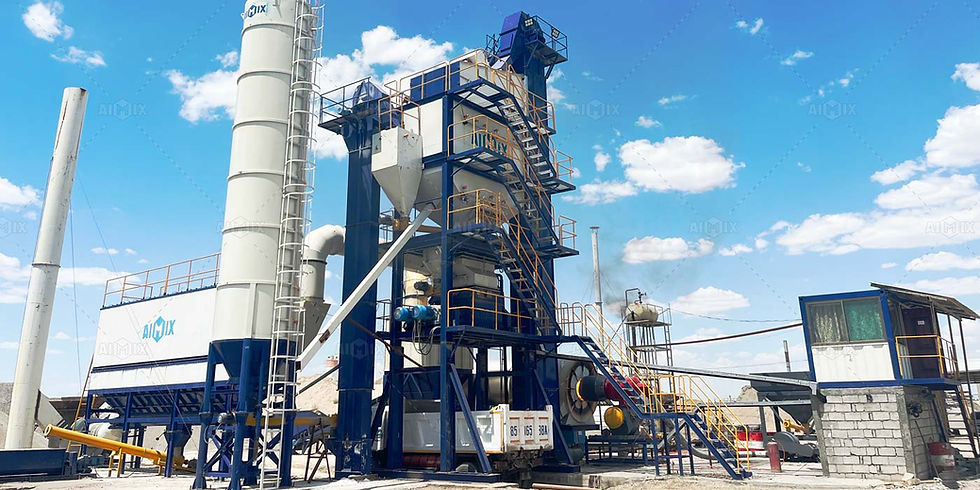What Capacity of Asphalt Mixing Plant is Suitable for Producing Asphalt for a Daily Paving Volume of 500 to 1000 Tons?
- aimixglobal5
- Jul 2, 2025
- 4 min read
Choosing the right asphalt mixing plant capacity is a key decision for road construction companies. If your project requires paving 500 to 1000 tons of asphalt per day, selecting an asphalt mixing plant that can efficiently support this volume will directly impact your construction progress, asphalt quality, and overall project costs. In this article, I will help you understand how to select the right asphalt plant capacity for your specific daily paving needs, considering real project conditions and industry practices.

Why Matching Asphalt Plant Capacity to Daily Paving Volume Matters
The capacity of the asphalt mixing plant must align with your daily paving target. An asphalt hot mix plant that is too small will slow down your project, while an oversized plant may lead to unnecessary investment and higher operational costs. For paving volumes between 500 to 1000 tons per day, making the right capacity choice is essential to keep your project on schedule and ensure efficient material use.
Understanding this connection between plant capacity and paving requirements is the first step to making an informed decision.
How to Calculate the Suitable Asphalt Plant Capacity
To select the right asphalt plant, you need to consider both daily production and hourly output. Let’s break it down:
Daily paving volume: 500 to 1000 tons
Standard working hours: Typically 8 to 10 hours per day
For example, if you need to pave 800 tons per day and you operate for 10 hours, your required plant capacity should be around 80 tons per hour (TPH). However, in real operations, you need to allow for plant start-up time, maintenance, and possible delays. It’s better to choose a plant with a slightly higher capacity to ensure stable and continuous supply. In this case, a 100 TPH asphalt mixing plant is more practical.
This calculation helps you find a realistic plant capacity that matches your daily output while considering on-site working conditions.

Recommended Asphalt Mixing Plant Capacities for 500 to 1000 Tons Per Day
Based on our experience with various projects, here are our recommendations:
1. For 500 Tons Per Day: 60-80 TPH Asphalt Mixing Plant
If your paving volume is around 500 tons per day, a 60 to 80 TPH plant can meet your needs comfortably. This plant size balances production speed and investment cost. It is also compact, easy to install, and suitable for medium-scale projects.
2. For 800 to 1000 Tons Per Day: 100-120 TPH Asphalt Mixing Plant
If your paving volume ranges from 800 to 1000 tons per day, a 100 to 120 TPH plant will offer sufficient capacity to maintain a stable asphalt supply throughout the workday. This size is commonly used for highway paving, urban road projects, and municipal works.
Selecting an asphalt mix plant in this capacity range will help you avoid frequent shutdowns, minimize waiting time for pavers, and improve site efficiency.

Choosing Between Mobile and Stationary Asphalt Plants
After determining the required capacity, you also need to decide whether to select a mobile or stationary asphalt mixing plant. This choice depends on your project type and site mobility requirements.
When to Choose a Mobile Asphalt Plant
If your paving projects are spread across different locations or if you need quick relocation, a mobile asphalt plant is a smart option. Mobile plants offer faster installation and easier transport. For example, our mobile plants with 60-100 TPH capacity can be set up quickly and support daily paving volumes up to 1000 tons.
When to Choose a Stationary Asphalt Plant
If you are working on long-term projects or operating in a fixed site, a stationary asphalt mixing plant will be more suitable. It provides higher stability, more storage capacity, and lower operating costs over time. Our stationary plants ranging from 80-120 TPH are ideal for consistent high-volume paving requirements.
Deciding between mobile and stationary plants will help you maximize operational flexibility or long-term cost efficiency, depending on your project scale and location.

Other Factors to Consider When Selecting Asphalt Plant Capacity
Besides daily paving volume and plant mobility, you should also pay attention to:
Type of asphalt mix required – Different mixes may affect production speed.
Material moisture content – Wet materials may slow production.
Local climate conditions – Rain or high humidity may influence plant efficiency.
Evaluating these factors ensures that your selected asphalt plant performs consistently in your specific working environment.
Why Choose AIMIX Asphalt Mixing Plants for Your Projects
At AIMIX, we offer a wide range of asphalt mixing plants designed to meet various project scales, including both mobile and stationary options. Our plants provide stable performance, user-friendly control systems, and efficient mixing quality that fully support paving volumes from 500 to 1000 tons per day.
We also provide fast delivery, installation support, and local after-sales service in Indonesia. Our team is ready to help you select the most suitable asphalt plant that fits your daily paving needs and project site conditions.

Contact Us for Professional Asphalt Plant Solutions
If you are planning an asphalt paving project with daily volumes between 500 to 1000 tons, feel free to contact us for customized asphalt mixing plant recommendations. We will help you select the right capacity, configuration, and solution to maximize your project efficiency. Let’s build better roads together with AIMIX!



Comments